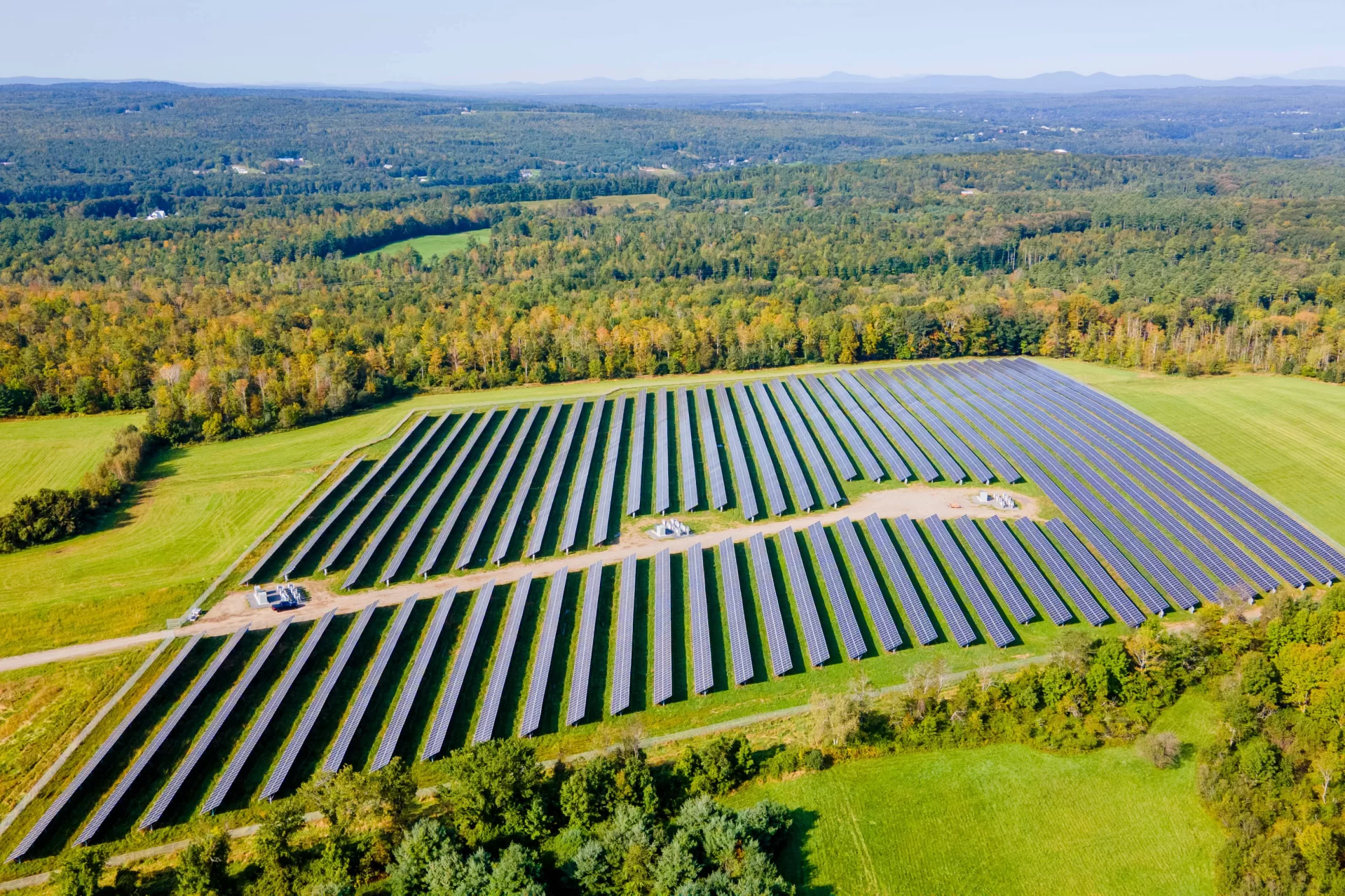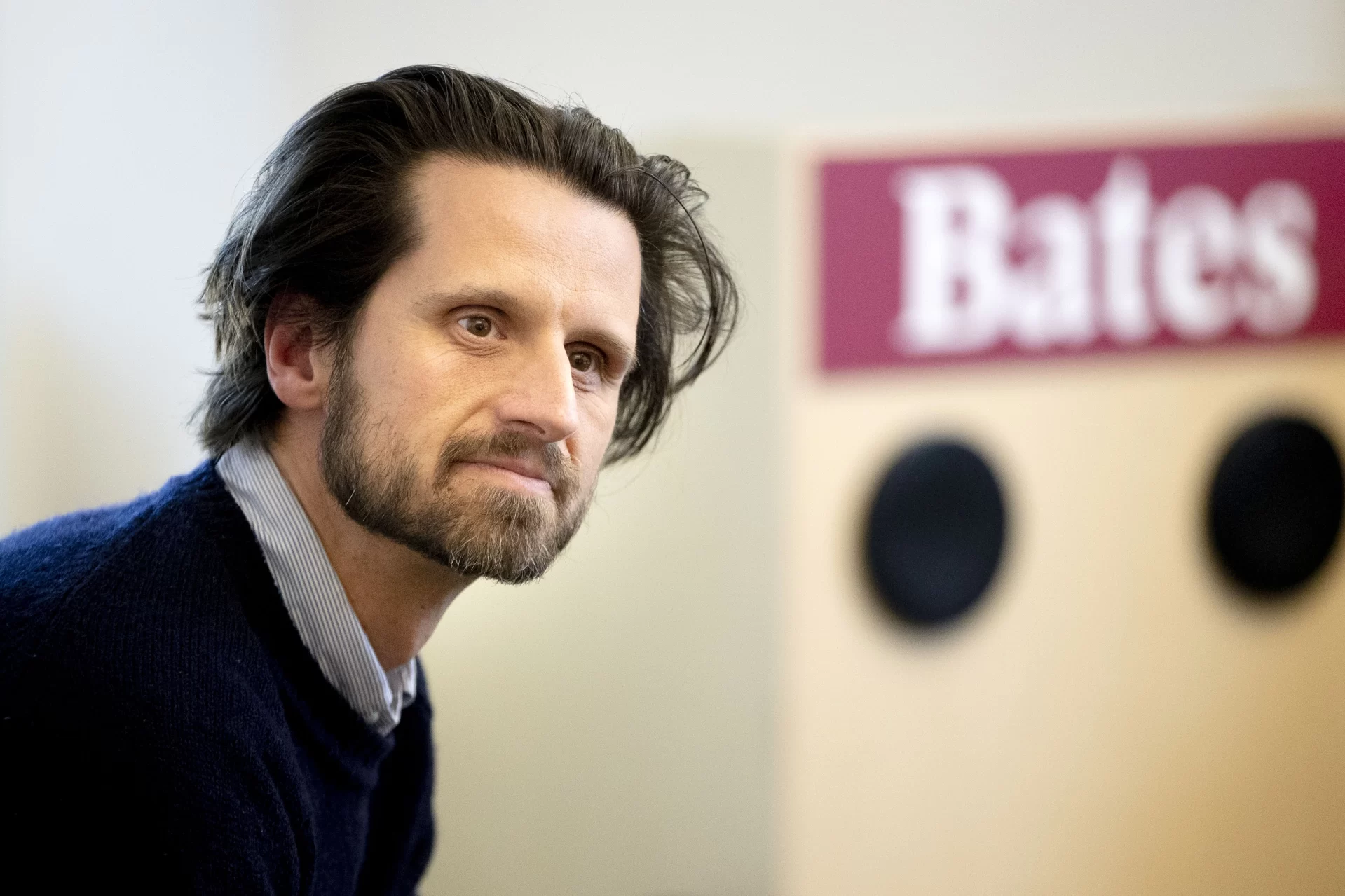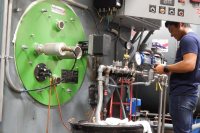
In February, we told you about a solar array under construction in the Maine town of Skowhegan that was designed to supply the electrical grid with an amount of juice equal to most of what the Bates campus consumes.
During the week of Sept. 11, that juice started to flow.
In a years-long process of planning and development, with students playing a decisive role, Bates partnered with REC Solar, a nationwide solar provider, and project contractor ReVision Energy, a South Portland-based leader in Maine’s solar-electric industry, to create the array on 20-plus acres of pasture land.
After about a year of construction, the installation of the array’s nearly 18,500 photovoltaic panels and related infrastructure was completed in August.

And last week the figurative switch was thrown connecting the facility to the grid, adding 7.131 megawatts of direct current to the region’s capacity. (The direct current is converted to alternating current for grid distribution to electrical customers.)
The array represents a win-win-win for the college, explains Tom Twist, Bates’ sustainability manager. One benefit is financial: a portion of the income from Maine solar credits will go to Bates. (In Maine, as in many states, eligible solar projects receive credits for electricity they generate.) These credits come at a good time, as the college has experienced the same spike in energy costs that people have seen at home in heating and electrical costs.
“For years, Bates has sought creative yet practical ways to make a net positive impact on the environment — while also saving money — and we’re honored to be a part of their inspiring sustainability journey.”
Lawrence Denney, REC Solar CEO
Switching perspectives from greenbacks to green — as in sustainable — the array is key to the course charted in the “sustainability roadmap” that the college developed and in 2022 formally adopted. One milestone on the map is the sourcing of the college’s entire electricity supply locally and renewably by 2045.
“This one project puts us way ahead of schedule to meet that 100 percent goal,” says Twist. “It leaves us only 25 percent of our power to make up” through smaller projects such as rooftop solar or additional ground-level arrays.
In addition to project contractor ReVision Energy, Bates partnered with REC Solar, a provider of commercial solar solutions, to furnish services including ownership, operation, and maintenance. “For years, Bates has sought creative yet practical ways to make a net positive impact on the environment — while also saving money — and we’re honored to be a part of their inspiring sustainability journey,” says REC Solar CEO Lawrence Denney.
Finally, as Twist says, Bates was able to align the solar project with its core mission: education. “There was a really strong theme of student involvement running all through this project.”

For example, once Bates had received responses to a formal request for proposals to develop the facility, “students were integral to the vetting of the different proposals.” They rendered varying expressions of data into uniform terms “so that we could compare apples to apples,” Twist explains. “Then they helped us crunch the numbers — what would make the most sense? Do we purchase a solar array outright or do we lease it? They had to understand federal policy, how would Bates get the best return, that sort of thing.”
“There were Bates students and alums up and down the chain working on this.”
Tom Twist, Bates sustainability manager
Twist says that it was a capstone community-engaged research project undertaken in 2016 by three environmental-studies majors that inspired the new solar facility. The three — Jack Martell and Mac McReynolds, both Class of 2017, and Matt Marcus ’18 — even recommended that Bates use the power-purchase agreement structure now in force with the Skowhegan array.

“Bates alums worked on the project, as well, through both ReVision and our consultant company, Freedom Energy,” he adds. (In fact, Martell was one of those alums. Now at the Boston-based solar energy company Nexamp, he was involved through Freedom Energy.) “That’s kind of nice, too. There were Bates students and alums up and down the chain working on this.”
In terms of both electrical output and the number of photovoltaic panels involved, the Skowhegan array is ReVision’s largest completed project to date. In development since 2018, that project is also the largest outcome thus far of a relationship with Bates that goes back even further.
“When leading institutions like Bates commit to clean energy, they show the wider community what’s possible.”
Dan Weeks, ReVision vice president for business development
Dan Weeks, ReVision’s vice president of business development, says that working with the college has been “a very positive experience” for the employee-owned firm. This makes sense, as both institutions are committed to social and environmental justice. (ReVision is a B Corp — a Certified Benefit Corporation — meaning one whose legally defined goals, in addition to turning a profit, include societal and environmental betterment.)
“We’re working to accelerate the clean-energy transition and prevent the worst effects of climate change,” says Weeks. “Solar farms like this one are critical to achieving our mission of a just and equitable electric future — not just because of the direct reduction in carbon pollution but also because they inspire others to act.
“When leading institutions like Bates commit to clean energy, they show the wider community what’s possible. Working with Bates, where as students many of our employee-owners first developed their passion for climate and clean energy, has been an honor for ReVision Energy. We look forward to continued collaboration in the years to come.”




